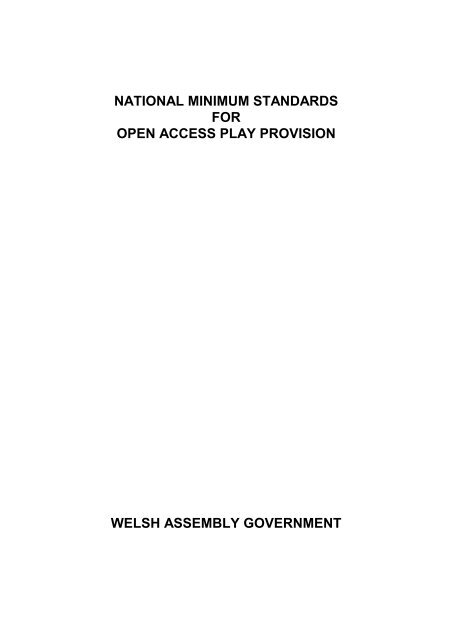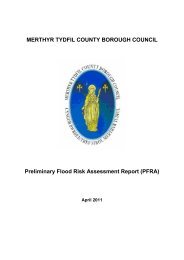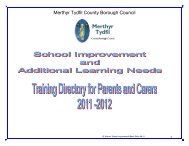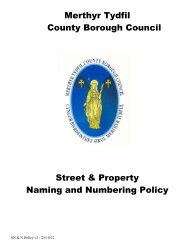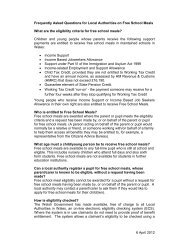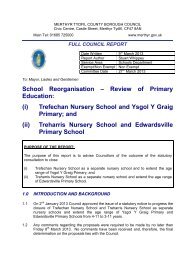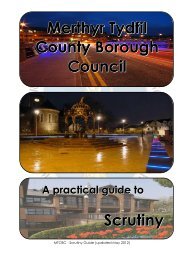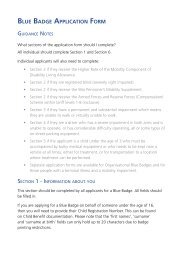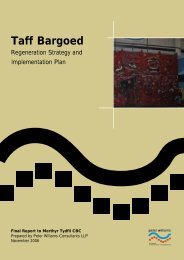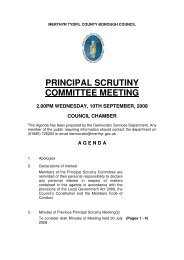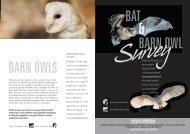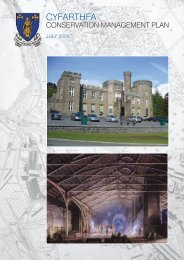national minimum standards for open access play provision welsh ...
national minimum standards for open access play provision welsh ...
national minimum standards for open access play provision welsh ...
- No tags were found...
You also want an ePaper? Increase the reach of your titles
YUMPU automatically turns print PDFs into web optimized ePapers that Google loves.
NATIONAL MINIMUM STANDARDSFOROPEN ACCESS PLAY PROVISIONWELSH ASSEMBLY GOVERNMENT
A statement of <strong>national</strong> <strong>minimum</strong> <strong>standards</strong> applicableto providers of <strong>open</strong> <strong>access</strong> <strong>play</strong> made by the Minister<strong>for</strong> Health and Social Services of the Welsh AssemblyGovernment under the powers conferred by section 79C of the Children Act 1989.SignedMinister <strong>for</strong> Health and Social ServicesWelsh Assembly Government12 November 2003The statement is applicable to providers of day care(as defined by section 79A of the Children Act 1989)from November 2003.The statement is accompanied, <strong>for</strong> explanatorypurposes only, by an introduction.INTRODUCTIONNATIONAL MINIMUM STANDARDS FOR PROVIDERSOF OPEN ACCESS PLAY1. This document sets out National Minimum <strong>standards</strong> <strong>for</strong> providers of<strong>open</strong> <strong>access</strong> <strong>play</strong> issued by the Welsh Assembly Government undersection 79C of the Children Act 1989. These <strong>standards</strong> will be usedby the Assembly’s Care Standards Inspectorate <strong>for</strong> Wales (CSIW)when determining whether providers of <strong>open</strong> <strong>access</strong> <strong>play</strong> areproviding adequate care <strong>for</strong> children under the age of eight and areotherwise complying with the relevant requirements. It replaces theequivalent National Minimum Standards previously in <strong>for</strong>ce. The<strong>standards</strong> will be kept under review and may be amended asappropriate.
2. The relevant requirements are set out in the Child Minding and DayCare (Wales) Regulations 2002 (“the Regulations”) and in theChildren Act 1989 (“the 1989 Act”), as amended by the CareStandards Act 2000. When CSIW exercise its functions under Part XAof the 1989 Act, any allegations that a provider has failed to haveregard to the <strong>standards</strong> must be taken into account. Similarconsideration will apply where the relevant Tribunal exercisesfunctions under the new <strong>provision</strong>s and in other <strong>for</strong>mal proceedingsunder that part of 1989 Act.3. It is hoped that these <strong>standards</strong> will be used <strong>for</strong> a range of purposes,and not just as part of the regulatory process. They may be used byproviders of <strong>open</strong> <strong>access</strong> <strong>play</strong> in considering the standard of careprovided, as an aid in the induction and training of staff and toprovide guidance when a person wishes to provide <strong>open</strong> <strong>access</strong><strong>play</strong>. They may also be used by parents as a guide to what theyshould expect of providers of <strong>open</strong> <strong>access</strong> <strong>play</strong>.4. The Regulations are made and these <strong>standards</strong> (which are referred toin the Regulations) are published under section 79C of the 1989 Act.They will apply from 1 st April 2002, as the <strong>provision</strong>s of theRegulations apply, unless otherwise stated.5. The 1989 Act as amended confers on the National Assembly thefunction of registration authority in relation to child minders and daycare providers as well as enabling regulations and <strong>standards</strong> to bemade. Compliance with the regulations and the extent to which childminders or day care providers, as the case may be, have had regardto the <strong>standards</strong>, will be taken into account by CSIW in makingjudgements about applications <strong>for</strong> registration, the imposition ofconditions and en<strong>for</strong>cement of compliance with the 1989 Act,including decisions about cancellation of registration or prosecution.Decisions of CSIW in the exercise of its registration functions may beappealed to an independent tribunal.6. The <strong>standards</strong> focus on achievable outcomes <strong>for</strong> children under theage of eight and their parents. They are grouped under a series ofkey topics. Each standard deals with a particular aspect and ispreceded by a statement of the outcome intended to be achieved bythe child minder or day care provider, as the case may be. Theregulations and <strong>standards</strong> have been designed to promote theachievement of that outcome.7. The “standard” dealing with a particular aspect of care <strong>provision</strong> isactually made up of a set of <strong>standards</strong> which are the numberedparagraphs beneath the “outcome” box. Each of these numberedparagraphs should be treated as a separate standard. The <strong>standards</strong>are intended to be qualitative, in that they provide a tool <strong>for</strong> judgingthe quality of care <strong>provision</strong> <strong>for</strong> under eight’s but they are alsodesigned to be measurable. In some cases, to ease comprehension,the <strong>standards</strong> repeat certain requirements of the regulations. This
should not be taken to mean that the particular regulatoryrequirement is altered in nature – the <strong>provision</strong>s of the regulationsmust still all be met.8. Inspecting against the regulations and <strong>standards</strong>, CSIW will follow aconsistent inspection methodology and reporting <strong>for</strong>mat across thecountry. In assessing whether or not a provider of <strong>open</strong> <strong>access</strong> <strong>play</strong>meets a particular regulatory requirement, CSIW will considercompliance with each of the <strong>standards</strong>.9. It is intended that these <strong>standards</strong> will be used, both by providers of<strong>open</strong> <strong>access</strong> <strong>play</strong> and CSIW to focus on securing positive welfareoutcomes <strong>for</strong> children under eight and reducing risks to their welfareand safety, rather than upon structures and systems <strong>for</strong> their ownsake. All providers of <strong>open</strong> <strong>access</strong> <strong>play</strong> and their staff should aim toprovide the best care possible <strong>for</strong> the children they look after andhaving regard to the <strong>standards</strong> is an essential part, but only a part, ofthe overall responsibility to safeguard and promote the welfare ofeach individual child.10. The <strong>standards</strong> have been prepared following an extensiveconsultation programme. Account has been taken of responses tothe consultation in developing the final version of the <strong>standards</strong>. The<strong>standards</strong> are intended to be realistic, proportionate, fair andtransparent.
ContentsPageDefinition ............................................................................................. 1Choice of ServiceStandard 1 In<strong>for</strong>mation ........................................................................... 2Planning <strong>for</strong> Individual Needs and PreferencesStandard 2 Special needs (including special educational needs ............ 2and disabilities)Standard 3 Working in partnership with parents ..................................... 3Standard 4 Records ................................................................................ 3Quality of LifeStandard 5 Opportunities <strong>for</strong> <strong>play</strong> and learning ....................................... 4Quality of Care and TreatmentStandard 6 Behaviour ............................................................................. 5Standard 7 Health care ........................................................................... 6Standard 8 Medication ............................................................................ 7Standard 9 Food and drink ..................................................................... 7StaffingStandard 10 Suitable person ..................................................................... 8Conduct and Management of the ServiceStandard 11 Organisation .......................................................................... 9Standard 12 Staffing ratios ....................................................................... 9Standard 13 Equal opportunities .............................................................. 10Standard 14 Financial procedures ........................................................... 11Complaints and ProtectionStandard 15 Complaints .......................................................................... 11Standard 16 Child Protection .................................................................... 12The Physical EnvironmentStandard 17 Premises .............................................................................. 12Standard 18 Equipment ............................................................................ 13Standard 19 Safety................................................................................... 14
OPEN ACCESS PLAY PROVISIONDefinitionOpen Access Play Provision may be permanent or short-term schemes andgenerally cater <strong>for</strong> older children. However, children aged five to seven yearsmay attend. The main purpose of the <strong>provision</strong> is to enable children to learnand develop through <strong>play</strong> opportunities in a safe environment in the absenceof their parents.Whenever the word “parent” is used in this document, it should be taken tomean parent or carer.1
CHOICE OF SERVICESTANDARD 1: INFORMATIONOUTCOMEParents and children have <strong>access</strong> to the in<strong>for</strong>mation they need to make anin<strong>for</strong>med choice about the <strong>open</strong> <strong>access</strong> <strong>play</strong> <strong>provision</strong> that is available.1.1 The registered person makes available sufficient in<strong>for</strong>mation to parentsand children to enable them to make an in<strong>for</strong>med choice.1.2 The registered person compiles a statement of purpose as set out inthe regulations, and provides written and verbal in<strong>for</strong>mation to prospectiveparents and children about the service they provide. This will include:numbers and ages of children who can attendthe languages through which <strong>play</strong>workers will workwhat <strong>provision</strong> can be made <strong>for</strong> children with special needs<strong>open</strong> <strong>access</strong> policy<strong>open</strong>ing hourscontact in<strong>for</strong>mationstaffingroutinesin<strong>for</strong>mation about activities provided <strong>for</strong> childrenarrangements <strong>for</strong> making complaints to the registered person, and tothe Care Standards Inspectorate <strong>for</strong> Wales.PLANNING FOR INDIVIDUAL NEEDS AND PREFERENCESSTANDARD 2: SPECIAL NEEDS (INCLUDING SPECIAL EDUCATIONALNEEDS AND DISABILITIES)OUTCOMEChildren with special educational needs and disabilities benefit from the waytheir welfare and development are promoted within the setting.2.1 The registered person and <strong>play</strong>workers are aware that some childrenmay have special needs and ensure that appropriate action is taken whensuch a child is identified or first attends the setting. Steps are taken topromote the welfare and development of the child within the setting.2.2 Registered persons have a written statement about special needs.This is consistent with current legislation and the current Code of Practice <strong>for</strong>the Identification and Assessment of Special Educational Needs. It isavailable to parents.2.3 The registered person and <strong>play</strong>workers can show that the staffingarrangements meet the needs of individual children who attend and havespecial needs.2
2.4 The physical environment is, as far as is reasonable, suitable <strong>for</strong> allchildren including those with disabilities.2.5 Children with special needs attending day care have <strong>access</strong> alongsidetheir peers to the facilities, activities and <strong>play</strong> opportunities provided wheneverreasonable, in order to meet their <strong>play</strong> needs and promote their welfare anddevelopment.2.6 Registered persons consult with parents about the need <strong>for</strong> any specialservices and equipment <strong>for</strong> the children who attend.2.7 Registered persons ensure the privacy of all children when intimatecare is being provided.STANDARD 3: WORKING IN PARTNERSHIP WITH PARENTSOUTCOMEThe child’s needs are met through a partnership between his/her parents andthe setting.3.1 The registered person and <strong>play</strong>workers work in partnership withparents to meet the needs of the children, both individually and as a group.3.2 The registered person ensures in<strong>for</strong>mation on the policies andprocedures operating within the setting is available to parents.3.3 There is a system in place <strong>for</strong> the exchange of in<strong>for</strong>mation betweenparent and staff member.3.4 Volunteers and committee members are given full in<strong>for</strong>mation andguidance on their roles and responsibilities.3.5 Playworkers are aware of the need to maintain privacy andconfidentiality, but know when to share in<strong>for</strong>mation appropriately in, <strong>for</strong>example, child protection cases.STANDARD 4: RECORDSOUTCOMEParents and the CSIW have <strong>access</strong> as appropriate to a full range of recordsmaintained by the registered person <strong>for</strong> the smooth running of the setting.4.1 The registered person maintains a full range of detailed records.4.2 The registered person keeps records as set out in the Regulations on:the name, address, date of birth and sex of all children looked after in the<strong>play</strong> <strong>provision</strong>3
the contact details <strong>for</strong> all parents/those with parental responsibilitydaily records of attendancenames, addresses and telephone numbers of the registered person, theresponsible individual and staffdaily register of staff attendinga record of accidents, serious illnesses and other significant eventsa record of any medicines administered4.3 Any records about individual children are shared with the child’s parentexcept where this would place the child's welfare at risk.4.4 The registered person keeps records about individual childrenconfidential, and retains them <strong>for</strong> a period of at least three years after the lastdate on which the children attended. The registered person maintains recordsin line with the terms of their insurance.4.5 The records are always available <strong>for</strong> inspection by the CSIW.4.6 The CSIW is in<strong>for</strong>med of the following at the earliest opportunity in linewith the Regulations:any changes in the officers of the body running the setting, the person incharge, members of staff and people living on the premises;any change in the name or home address of any of the above;any significant changes to the premises or any change of address;any significant changes to the type of care or in the hours in which care isprovided ;any infectious disease, serious injury or deathallegations of serious harm or abuse by a member of staff or volunteer orany abuse which is alleged to have taken place on the premises;any other significant event likely to affect the suitability of the registeredperson, or likely to affect the welfare of the child.4.7 The registered person retains a copy of the most recent inspectionreport from CSIW, and where applicable Estyn, together with resultant actionplans. These documents are available to parents.QUALITY OF LIFESTANDARD 5: OPPORTUNITIES FOR PLAY AND LEARNINGOUTCOMEChildren experience a range of activities which assist with their emotional,physical, social, intellectual, creative and language development.5.1 Registered persons provide activities and <strong>play</strong> opportunities whichcontribute to children’s emotional, physical, social, creative and intellectual,including language capabilities.4
5.2 The registered person plans a range of activities and <strong>play</strong> opportunitiesand provides resources which are appropriate to the ages and interests of thechildren attending.5.3 The registered person plans and provides activities and <strong>play</strong>opportunities which allow children to use their imagination and in which theyhave as much choice as possible.5.4 Registered persons and <strong>play</strong>workers listen and value what childrensay, they talk with them about what they are doing and actively encouragechildren to explore their full potential.5.5 Registered persons and <strong>play</strong>workers encourage children to beconfident, independent and develop their self-esteem.5.6 Registered persons ensure all <strong>play</strong>workers help children to develop asense of what is right and wrong.QUALITY OF CARE AND TREATMENTSTANDARD 6: BEHAVIOUROUTCOMEA child’s behaviour is managed in such a way as to promote their welfare anddevelopment.6.1 The registered person and <strong>play</strong>workers are able to manage a widerange of children’s behaviour in a way which promotes their welfare anddevelopment.6.2 Registered persons produce a written policy on BehaviourManagement, including bullying, which states the methods used to managechildren’s behaviour. This is fully understood and followed by all staff and isavailable to parents.6.3 Registered persons create an environment that encourages children totreat others with respect and consideration.6.4 Adult handling of behaviour is consistent and developmentallyappropriate, respecting individual children’s level of understanding andmaturity.6.5 Physical punishments, or the threat of them, are not used. Childrenare never shaken, smacked, humiliated shouted at, intimidated or shamed.6.6 Adults do not use any <strong>for</strong>m of physical intervention, e.g. holding,unless it is necessary to prevent personal injury to the child, other children, anadult or serious damage to property. Any significant incident is recorded andthe parent in<strong>for</strong>med of the incident on the day.5
6.7 The registered person and <strong>play</strong>workers are alert to instances ofbullying and children are encouraged to report such incidents.STANDARD 7: HEALTH CAREOUTCOMEChildren benefit from the way in which the registered person promotes thegood health of children.7.1 The registered person promotes the good health of children and takespositive steps to prevent the spread of infection and appropriate measureswhen they are ill.7.2 The premises and equipment are clean.7.3 The registered person ensures that <strong>play</strong>workers are in<strong>for</strong>med andaware of the importance of good hygiene practice in order to prevent thespread of infection. Playworkers are in<strong>for</strong>med of and kept up to date withhygiene procedures.7.4 The registered person ensures that any animals on the premises aresafe to be in the proximity of children and do not pose a health risk.7.5 Those responsible <strong>for</strong> the preparation and handling of food are fullyaware of and comply with regulations relating to food safety and hygiene.7.6 There is a first aid box complying with the First Aid Regulations 1981,the contents of which are checked frequently and replaced as necessary by adesignated member of staff. This is readily <strong>access</strong>ible to staff, but kept outof the reach of children.7.7 There is at least one member of staff with a current first aid trainingcertificate on the premises or on outings at any one time. The first aidqualification includes training in first aid <strong>for</strong> young children.7.8 Written parental permission is obtained to the seeking of anynecessary emergency medical advice or treatment.7.9 There is a policy about managing children who are ill or infectious.This includes a procedure <strong>for</strong> contacting parents or another adult designatedby the parent if a child becomes ill whilst in the settings.7.10 Sandpits are protected from contamination. The sand is clean andfree from hazards.7.11 There is no smoking within the setting.6
STANDARD 8: MEDICATIONOUTCOMEChildren benefit from safe policies and practice about medication.8.1 The registered person has a clear policy, understood by all staff anddiscussed with parents, about the administration of medication.8.2 If medication is to be given, the following practices should be followed:medicines are not usually administered unless they have been prescribed<strong>for</strong> that child by a doctor;medicines are stored in their original containers, clearly labelled with thechild’s name, and are in<strong>access</strong>ible to children;checks are made to ensure that any medication received into the setting isnot out of datethe parent gives prior written permission to administer any medication.8.3 Written records are kept of all medicines administered to children, andparents sign the record book to acknowledge the entry; If appropriate, detailsshould be obtained of the exact time any current medication was lastadministered.8.4 If the administration of prescription medicines requirestechnical/medical knowledge then individual training is provided <strong>for</strong> staff froma qualified health professional. Training is specific to the individual childconcerned.8.5 The registered person has confirmed that the administration ofmedication con<strong>for</strong>ms to their insurance cover.STANDARD 9: FOOD AND DRINKOUTCOMEChildren are provided with regular drinks and food in adequate quantities <strong>for</strong>their needs.9.1 The registered person ensures that any food and drink which childrenreceive is properly prepared, nutritious and complies with dietary and religiousrequirements.9.2 Fresh drinking water is available to children at all times.9.3 If snacks and drinks are provided, the registered person requestsin<strong>for</strong>mation from parents about any special dietary requirements, preferencesor allergies, the child may have. Where these exist, the registered personmakes a record and takes heed of the in<strong>for</strong>mation provided.9.4 All food is stored safely. If parents provide a packed lunch, they areadvised of what can be stored safely.7
STAFFINGSTANDARD 10: SUITABLE PERSONOUTCOMEChildren benefit from suitable staff.10.1 The registered person is able to demonstrate their suitability andensures that adults providing day care, looking after children or havingunsupervised <strong>access</strong> to them are suitable to do so.10.2 The registered person provides all in<strong>for</strong>mation requested by the CSIWin order to establish their suitability and the suitability of their staff andvolunteers. This will comply with the Regulations and include a police check.All checks are completed be<strong>for</strong>e anyone is left alone with children.10.3 The registered person ensures that any person who has not beenvetted is never left alone with children.10.4 From 1 April 2008, the registered person ensures that the person incharge possesses at least a level 3 qualification within ACCAC’s NationalQualifications Framework <strong>for</strong> Early Years Education, Childcare and Playworkwhich is appropriate to the post. In the period until 1 April 2008, the registeredperson will set out an action plan detailing how they intend to meet thiscriterion and in what timescale.10.5 The registered person ensures that at least 50% of <strong>play</strong>workers havequalifications at least level 2 from ACCAC’s National QualificationsFramework <strong>for</strong> Early Years Education, Childcare and Playwork appropriate tothe post and to the age of the children. Playworkers who do not haveprevious experience of <strong>play</strong>work, receive training on <strong>play</strong> and the importanceof different types of <strong>play</strong> to children and their development.10.6 Prior to their appointment, a person in charge has at least 2 years’experience of working in a day care setting.10.7 The registered person ensures that all <strong>play</strong>workers under the age of 18years are closely supervised at all times.10.8 All <strong>play</strong>workers are required to be mentally and physically capable ofcaring <strong>for</strong> children.10.9 All <strong>play</strong>workers are required to have the appropriate experience, skillsand ability to do their jobs.10.10 All <strong>play</strong>workers receive induction training which includes health andsafety and child protection policies and procedures during their first week ofemployment.8
10.11 The continuing training needs of <strong>play</strong>workers are addressed, andprovided <strong>for</strong>, on a regular basis.10.12 All paid staff receive regular supervision which encourages them tothink about the quality of their practice. They receive <strong>for</strong>mal appraisal at leastonce a year. Staff are encouraged to consider publications on self-evaluationsuch as the Play Wales publication “The First Claim”.CONDUCT AND MANAGEMENT OF THE SERVICESTANDARD 11: ORGANISATIONOUTCOMEChildren benefit from a well-organised and planned day care service.11.1 The registered person makes the most of the space and resourcesthey have available in order to meet the children’s needs effectively.11.2 The registered person demonstrates that <strong>play</strong>workers are employedeffectively within the premises to ensure the safety, welfare and developmentof children.11.3 There are recognised procedures <strong>for</strong> managing the absence of theregistered person.11.4 The registered person and <strong>play</strong>workers ensure that children have theopportunity to interact with them. They actively seek to build goodrelationships with the children attending. When preparing a programme ofactivities and <strong>play</strong> opportunities, these include opportunities <strong>for</strong> small groupsof children to <strong>play</strong> together.STANDARD 12: STAFFING RATIOSOUTCOMEChildren’s needs are best met through a ratio of adults to children whichcon<strong>for</strong>ms with best practice.12.1 The registered person meets the required adult:child ratios.12.2 The normal <strong>minimum</strong> staffing ratio is 1:13 children aged five to sevenyears in Open Access Provision. Children under five do not generally attend.Ratios may need to be higher <strong>for</strong> schemes which operate in public parks.12.3 Staffing levels are maintained during outings but, according tocircumstances, it may be necessary to exceed them.12.4 At least two <strong>play</strong>workers are on duty.12.5 Care provided <strong>for</strong> children aged over seven is not allowed to adverselyaffect the care provided <strong>for</strong> children under eight years of age.9
12.6 Regular volunteers and trainees can be taken into account in thenormal staffing ratios.12.7 The registered person ensures that suitable contingency arrangementsare in place to cover emergencies and unexpected staff absences, andsufficient, suitable staff and volunteers to cover staff breaks, holidays,training, sickness and time spent with parents.12.8 The registered person maintains written operating procedures <strong>for</strong> eachspecialist activity programme they offer, which are appropriate to the site andlevel at which activities are undertaken. Operating procedures define thecompetencies, qualifications and/or experience required of staff undertakingdifferent levels of responsibility. The procedures are consistent with theHealth and Safety Executive Guidelines, where appropriate, Activity CentreAdvisory Committee Guidelines, where established, and with the NationalGoverning Body Guidelines, where they are relevant, to the safe conduct ofthe activity at the level undertaken. All staff with management responsibility<strong>for</strong> an activity possess the competencies, qualifications and experiencerequired to discharge the responsibility. An activities licence is requiredwhere applicable.12.9 Where <strong>play</strong> <strong>provision</strong> operates indoors, the registered person has asystem which enables them to know which children are on their premises.STANDARD 13: EQUAL OPPORTUNITIESOUTCOMEAll children attending an <strong>open</strong> <strong>access</strong> <strong>play</strong> <strong>provision</strong> are treated with equalconcern and respect.13.1 The registered person and <strong>play</strong>workers actively promote equalityof opportunity and anti-discriminatory practice <strong>for</strong> all children.13.2 The registered person has and periodically reviews an equalopportunities policy consistent with current legislation and guidance. All<strong>play</strong>workers and volunteers understand and implement this policy and it isavailable to parents.13.3 All children and adults are treated with equal concern. The registeredperson complies with relevant anti-discriminatory legislation and goodpractice. The registered person promotes equal opportunities in the areas ofemployment, training, admission to day care and <strong>access</strong> to the resources,activities and facilities available.13.4 The registered person liases with parents to ensure that all children’srecords contain in<strong>for</strong>mation which enables appropriate care to be given.10
STANDARD 14: FINANCIAL PROCEDURESOUTCOMEChildren and their parents are safeguarded by the registered personoperating sound financial procedures.14.1 The registered person ensures that he/she operates effective financialprocedures.14.2 The registered person carries adequate public liability insurance.14.3 The registered person retains records of all financial transactionsentered into by the <strong>provision</strong> and makes them available to the CSIW uponrequest.COMPLAINTS AND PROTECTIONSTANDARD 15: COMPLAINTSOUTCOMEChildren and their parents are confident that their complaints will be listenedto, taken seriously and acted on.15.1 The registered person operates a simple, clear and <strong>access</strong>iblecomplaints procedure.15.2 The registered person has a written complaints procedure which isavailable to parents. This includes the name and telephone number of therelevant Regional office of the Care Standards Inspectorate <strong>for</strong> Wales.15.3 The registered person considers and/or investigates all complaints.15.4 The registered person ensures that the complainant is notified of theoutcome.15.5 The registered person keeps an accurate and detailed record of allcomplaints, which includes the following in<strong>for</strong>mation:name of complainantnature of complaintdate and time of complaintaction taken in response to complaintresult of complaint investigationin<strong>for</strong>mation given to complainant.15.6 The registered person ensures that all complaints are handled in asensitive and confidential manner.11
STANDARD 16: CHILD PROTECTIONOUTCOMEAll children are protected from abuse by the actions of the registered person.16.1 The registered person draws up and implements a child protectionpolicy which links into the arrangements of the local Area Child ProtectionCommittee and ensures that all adults working and looking after children inthe <strong>provision</strong> are able to put the policy into practice.16.2 The protection of the child is the registered person’s first priority.16.3 The registered person has a written statement, based on the AreaChild Protection Committee (ACPC) procedures, clearly stating staffresponsibilities with regard to the reporting of suspected child abuse orneglect and including contact names and telephone numbers. It includesprocedures to be followed in the event of an allegation being made against amember of staff or volunteer. These procedures are shared with parentsbe<strong>for</strong>e admission to day care.16.4 The registered person ensures that: a designated member of staff has attended a child protection trainingcourse and is responsible <strong>for</strong> liaison with child protection agencies in anychild protection situation; other staff are aware of child protection issues and are able to implementthe policies and procedures.16.5 The registered person ensures that all staff are aware of possiblesymptoms of children at risk and are aware of their responsibility toreport concerns according to ACPC procedures without delay; andkeep concerns confidential to as few people as need to know.THE PHYSICAL ENVIRONMENTSTANDARD 17: PREMISESOUTCOMEThe children receive a service in premises that are safe, secure and suitable<strong>for</strong> their purpose.17.1 The physical environment is safe, secure, and suitable <strong>for</strong> purpose. Itprovides adequate space in an appropriate location, is welcoming to children.It offers <strong>access</strong> to the necessary facilities <strong>for</strong> a range of activities whichpromote their development.17.2 The setting is welcoming and friendly to children and parents.17.3 If premises are part of the <strong>provision</strong>, they are clean, well lit withadequate natural lighting, adequately ventilated and maintained in a suitablestate of repair and decoration.12
17.4 If premises are part of the <strong>provision</strong>, the rooms used <strong>for</strong> <strong>open</strong> <strong>access</strong><strong>play</strong> are <strong>for</strong> the sole use of the <strong>provision</strong> during the hours of operation.17.5 If premises are part of the <strong>provision</strong>, the registered person ensures thatany local planning and building control requirements are met.17.6 Whether or not premises are part of the <strong>provision</strong>, there is <strong>access</strong> to atelephone.17.7 If premises are part of the <strong>provision</strong>, rooms are maintained at anadequate temperature.17.8 There is a <strong>minimum</strong> of 2.3 square metres space per child.17.9 Play areas are large enough to give scope <strong>for</strong> free movement and wellspread out activities. There are separate areas <strong>for</strong> different activities.17.10 There is adequate storage space <strong>for</strong> equipment.17.11 If outdoor <strong>play</strong> space adjoining the premises is provided, it is safe,secure and well maintained.17.12 If premises are part of the <strong>provision</strong>, there is normally one toilet andone wash hand basin with hot and cold water available <strong>for</strong> every 10 children.17.13 If there is a kitchen area, children do not have <strong>access</strong> to it unless it isbeing used solely <strong>for</strong> a supervised children’s activity.STANDARD 18: EQUIPMENTOUTCOME:Children have <strong>access</strong> to furniture, equipment and toys that are appropriateand suitable <strong>for</strong> their needs.18.1 The registered person provides furniture, equipment and toys that areappropriate <strong>for</strong> their purpose and help to create an <strong>access</strong>ible and stimulatingenvironment. They are of suitable design and condition, well maintained andcon<strong>for</strong>m to safety <strong>standards</strong>.18.2 The registered person ensures that sufficient, suitable equipment andmaterials are available to provide stimulating activities and <strong>play</strong> opportunities<strong>for</strong> the children. These are appropriate <strong>for</strong> the ages and individualdevelopmental needs of the children.18.3 Furniture, toys and equipment are in good repair and con<strong>for</strong>m to BSEN safety <strong>standards</strong> or the Toys (Safety) Regulations where applicable.Where public, unsupervised <strong>play</strong>grounds are used, registered persons ensurethat the children do not use faulty equipment.18.4 There is adequate equipment <strong>for</strong> outdoor and sporting activities whereapplicable. Where the premises include outside space, fixed climbing frames13
and other large equipment, they con<strong>for</strong>m to BS EN <strong>standards</strong> whereapplicable, and are securely anchored to the ground.18.5 During water sports, adequate life saving equipment and buoyancyaids are provided.STANDARD 19: SAFETYOUTCOMEChildren have their needs met in a safe environment.19.1 The registered person takes positive steps to promote safety within thesetting and on outings, and ensures proper precautions are taken to preventaccidents.19.2 The registered person takes reasonable steps to ensure that hazardsto children on the premises, both inside and outside, are minimised and isaware of, and complies with, health and safety regulations. Staff are trainedto have an understanding of health and safety requirements <strong>for</strong> theenvironment in which they work.19.3 The registered person conducts a risk assessment of the setting. Thisis reviewed if there is a significant change or if the provider suspects that it isno longer valid. An action plan with timescales identifies action to be taken tominimise identified risks.19.4 Gas and electrical appliances and fittings are properly guarded,con<strong>for</strong>m to safety requirements and do not pose a hazard to children.Appropriate annual checks are carried out and certificates are available <strong>for</strong>inspection by the CSIW.19.5 In <strong>open</strong> <strong>access</strong> <strong>play</strong> <strong>provision</strong>, children are able to leaveunaccompanied. However, the registered person ensures the security ofchildren while on the premises by ensuring that a system <strong>for</strong> managing<strong>access</strong> to the <strong>provision</strong> is in place, including keeping a record of adult visitors.In schemes operating in public parks or other public areas, the registeredperson ensures that children are not put at risk from other members of thepublic and are protected from any unwanted attention.19.6 Children are supervised at all times.19.7 Ponds, drains, pools or any natural water, are made safe orin<strong>access</strong>ible to children.19.8 Any door fitted with glass should have safety glass or be covered withprotective plastic film.19.9 All water sports are supervised by a qualified lifeguard.19.10 Potentially hazardous equipment is securely stored.14
19.11 There are clearly defined procedures <strong>for</strong> emergency evacuation of thebuilding. All staff have been trained in these procedures. Fire drills arecarried out periodically; all children are involved. The registered personcomplies with any recommendations made by the Fire Safety Officer andrecords are kept to their satisfaction.19.12 Fire doors are not obstructed. Fire exits are clearly identifiable andeasily <strong>open</strong>ed from the inside.19.13 Adequate fire detection and control equipment are readily available.19.14 The registered person ensures that there are operational procedures<strong>for</strong> the safe conduct of any outings provided. Records about vehicles inwhich children are transported, including insurance details and a list of nameddrivers, are kept. Drivers using their own transport have a valid licence,adequate insurance cover and a current MOT certificate where required15


